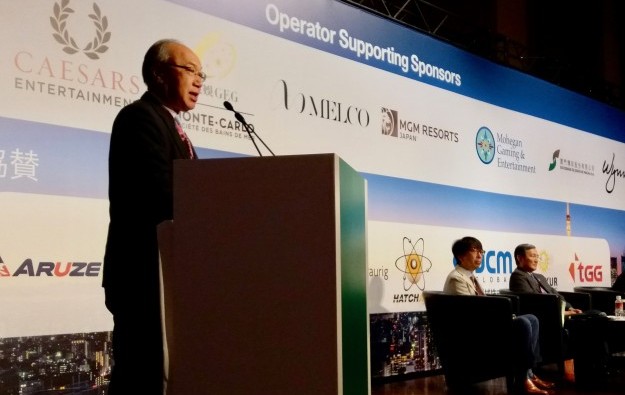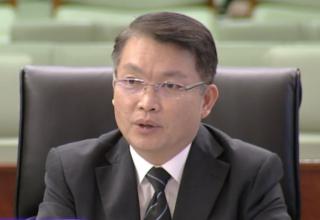Ageing Japan needs casino boost: hinterland official
May 11, 2018 Newsdesk Japan, Japan Gaming Congress 2018, Latest News

The idea behind attracting casino investors to Japan was to use private-sector money to tackle the public policy problem of Japan’s falling birth rate and ageing population, said Akihiko Sasaki (pictured left), deputy mayor of Tomakomai City on the southern coast of the northern island of Hokkaido.
Mr Sasaki was speaking on Friday, the second day of the Japan Gaming Congress in Tokyo. The conference is to discuss Japan’s nascent casino industry.
The official spelled out in a few words the nature of modern Japan’s challenges – a post-industrial society, relatively stagnating economy, low birth rate, ageing population, and disinclination to import foreign workers to cover certain job categories.
“The low birth rate and ageing process has led to a hollowing out of the downtown area, making it difficult to collect taxes,” said Mr Sasaki of his port city.
“Instead of using public money” to tackle this issue, his authority wanted to use “private money”, stated the official. “Despite the declining population, we want to reverse the trend of a declining economy,” he added.
He added in other comments in a follow-up discussion panel: “We have to take some kind of counter measure against that. We are seeing more tourists, but we are still weak in terms of attracting people for longer stays… We don’t have much infrastructure, so developers can use a green field site.”
Much of the media commentary on a Japanese casino industry has focused on the potential of large cities such as Osaka and Nagasaki. But Mr Sasaki talked up the virtues of the northern island of Hokkaido, which is noted for its inland scenery and winter sports.
“We want to promote things like sports tourism… and create world-class entertainment and an environmentally-friendly integrated resort,” stated Mr Sasaki.
The panel heard however that while Hokkaido represented 20 percent of Japan’s land mass, it had not created a unified bid among its local governments in order to make a proposal to the national government.
Wakayama prefecture, a local government that declared early its enthusiasm for hosting a casino resort, was also represented at Friday’s discussion. The local government was also notable initially for declaring that it would not allow Japanese to use any casino on its territory. It shortly afterwards reversed that position.
On Friday, Yoshinobu Nisaka, Wakayama’s governor, said use of “creative measures” would allow the issue of problem gambling to be addressed. “We can allow Japanese citizens into the casino,” he reiterated.
The official also spelled out a six-point plan for a Wakayama IR: a five-star hotel; meeting venues for international companies and academic conferences; a focus on Japan’s world-famous cuisine; an all-weather arena for international sports events and things such as e-Sports competitions; an interactive gaming centre using virtual reality technology; and the idea of “workation”, a combination of work and holiday in a single location.
Mr Nisaka said Wakayama also gave easy access to the surrounding Kansai region. Japan’s government has said it would like casino resorts to stimulate economic development not only in the immediate host location, but also in its hinterland.
A Wakayama casino resort could be a “concierge facility” to give access to “other forms of tourism in the Kansai area,” said Mr Nisaka.
He said a Wakayama resort was earmarked for a 40-hectare (98.8-acre) artificial island, about half of which was available for development. It would likely have 2,500 hotel rooms, and meeting space covering 50,000 square metres (538,200 sq feet). The likely budget for the resort was JPY280 billion (US$2.6 billion) with a projected payback period of 8.7 years, according to the official’s presentation.
Mr Nisaka said the deadline for the request for information for Wakayama would be the end of August.
Related articles
-
 Former casino suitor Wakayama to close...
Former casino suitor Wakayama to close...Jun 28, 2022
-
 Japan IR submission deadline passes...
Japan IR submission deadline passes...Apr 29, 2022
More news
-
 GKL provides its new table game...
GKL provides its new table game...Nov 22, 2024
-
 The Baron Upright, a new cabinet from...
The Baron Upright, a new cabinet from...Nov 22, 2024
Latest News
Nov 22, 2024
Casino operator Grand Korea Leisure Co Ltd (GKL) says it has achieved its first commercialisation of a new-to-market table game, developed via an in-house competition dating to 2021. Grand Korea...Sign up to our FREE Newsletter
 (Click here for more)
(Click here for more)
Pick of the Day
”As we navigate the final steps of the licensing process, we remain confident in our ability to align with Brazil’s regulatory requirements”
Eusebio Tanco
Chairman of DigiPlus Interactive
Most Popular
 Macau to get 36mln visitors in 2025: Secretary Lei November 21, 2024
Macau to get 36mln visitors in 2025: Secretary Lei November 21, 2024  Gaming technology firm IGT reports hacking incident November 21, 2024
Gaming technology firm IGT reports hacking incident November 21, 2024  Wynn Al Marjan building structure 55pct complete: promoter November 22, 2024
Wynn Al Marjan building structure 55pct complete: promoter November 22, 2024  EBITDA a focus in Macau market share battle: Jefferies November 21, 2024
EBITDA a focus in Macau market share battle: Jefferies November 21, 2024  Star Entertainment clinches US$130mln loan facility November 21, 2024
Star Entertainment clinches US$130mln loan facility November 21, 2024









